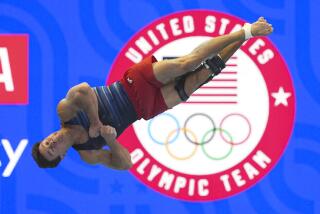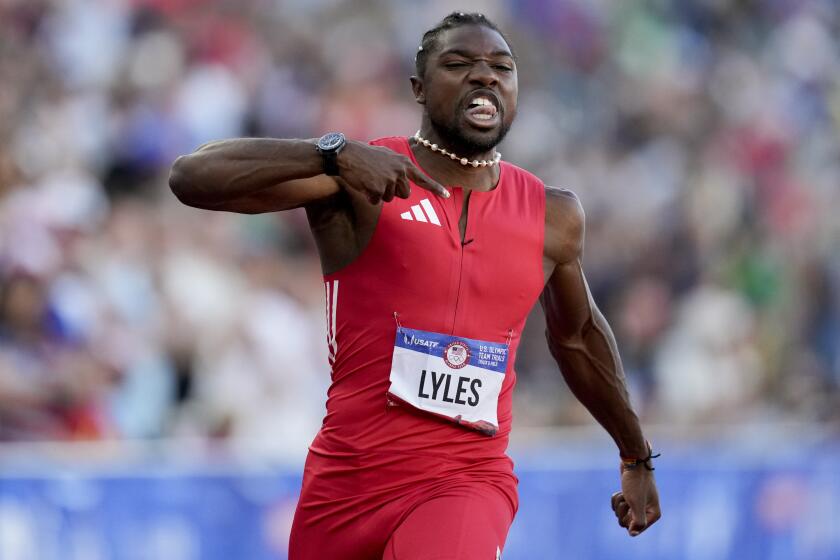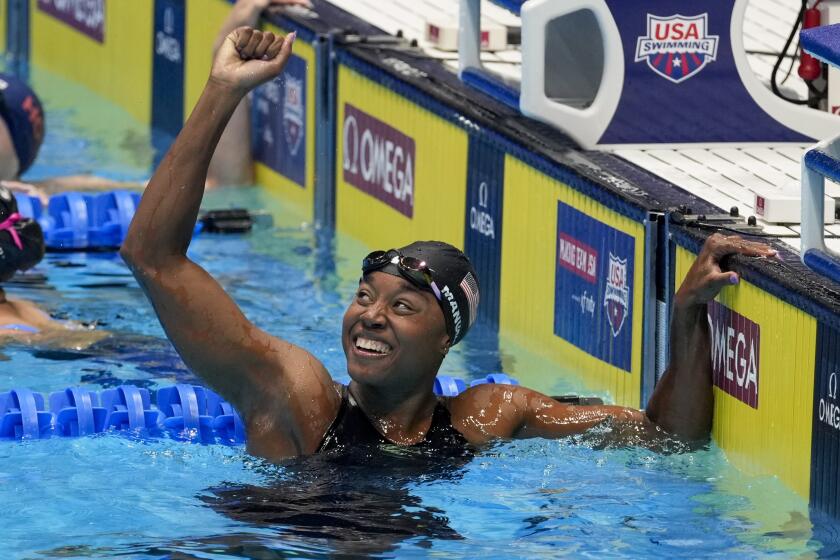He No-Shows True Colors
Scientists can call off their search for the missing link.
He has been found.
It’s Eric Heiden.
Recall, if you will, the American athletes and former athletes involved in the final minutes of the Olympic torch’s journey Friday night at the opening ceremony of these Salt Lake City Winter Games.
Bringing the flame into the stadium were figure skating champions Dorothy Hamill and Dick Button. They passed the torch to figure skating champions Peggy Fleming and Scott Hamilton, who handed off to champion skiers Bill Johnson and Phil Mahre.
Around the stadium they went before giving the fire to champion speedskaters Bonnie Blair and Dan Jansen. Taking the flame from them were the Sheas, father Jim, a former Olympian in Nordic combined, and son Jim Jr., competing here in skeleton. The original Olympian in the family, Jack Shea, a speedskating champion at Lake Placid in 1932, was to have been with them for a three-generational celebration but was killed last month in a traffic accident.
From the Sheas, the torch went to two still-competing gold medalists, hockey player Cammi Granato and skier Picabo Street, who ran it up the stadium to Mike Eruzione and other members of the 1980 “Miracle on Ice” hockey team, who together applied the flame to the Olympic caldron, where it will burn throughout the Games.
It was wonderful and heartwarming and all that, but it was also as obvious as a whiskey nose that something was wrong here. Someone was missing. Where, in that chain of America’s most productive Olympic athletes, was Eric Heiden? Possibly the most productive of them all.
What Heiden achieved at the 1980 Lake Placid Games was one of the remarkable athletic accomplishments of any era. He won all five men’s speedskating races--setting Olympic records in his first four, a world record in his fifth--events ranging from 500 to 10,000 meters. He won the sprints, the middle-distance events and the long-distance races. He obliterated the competition.
His feat was akin to winning a decathlon--not against decathletes but against the finest athletes in their sports. If King Gustav of Sweden, who in 1912 complimented Jim Thorpe on being the world’s greatest athlete, had seen Heiden, he would have had strong second thoughts.
People who watched on TV remember the Lake Placid Games for the hockey team. People who were there remember it every bit as much for Heiden.
Thus, how absolutely fitting it would have been for Granato and Street to have passed the torch to him, so he could in turn have handed it to the hockey players he’d professed such admiration for at Lake Placid.
So where was he Friday night? Certainly he had to have been asked.
Turns out, he was. Turns out, he said no thanks.
Speaking on Sporting News Radio, Heiden said he had been invited to be “one of the last guys” in the chain of athletes.
“I told them I wanted to be the last guy,” he said, obviously meaning he wanted to be the one lighting the caldron. “They said they couldn’t do that and I said, ‘Well, then, I have other things to do.’”
Classy, huh?
But not altogether surprising to those who had caught Heiden’s act at Lake Placid, whose Games he referred to as “the great whoopee!”
Twenty-two years ago, the world wanted to love Eric Heiden, not merely admire his feats. He made sure that didn’t happen by presenting himself as a smirking smart-aleck--a highly skilled, superbly trained, sensationally successful smart-aleck but a smart-aleck just the same. He responded to serious questions with pat answers, to less serious ones with retorts. He told the country that he was much more appreciated in Europe and was skating for himself, because it was something he liked to do.
Aloof to the point of arrogance, he lifted himself above it all, simply couldn’t be bothered.
You’d think a fine education--he’s now an orthopedic surgeon and doctor for the U.S. team here--and 22 years of living in the real world might have made him see things from a different perspective.
Apparently not.
In 1980, Heiden was a self-centered smart-aleck but he could be at least partially excused because he was a young self-centered smart-aleck.
It’s 2002 and Heiden is middle-aged. So what’s his excuse now?
More to Read
Go beyond the scoreboard
Get the latest on L.A.'s teams in the daily Sports Report newsletter.
You may occasionally receive promotional content from the Los Angeles Times.






